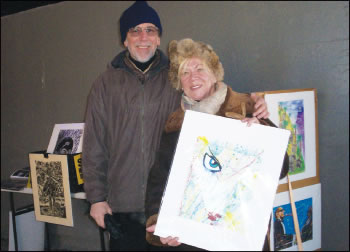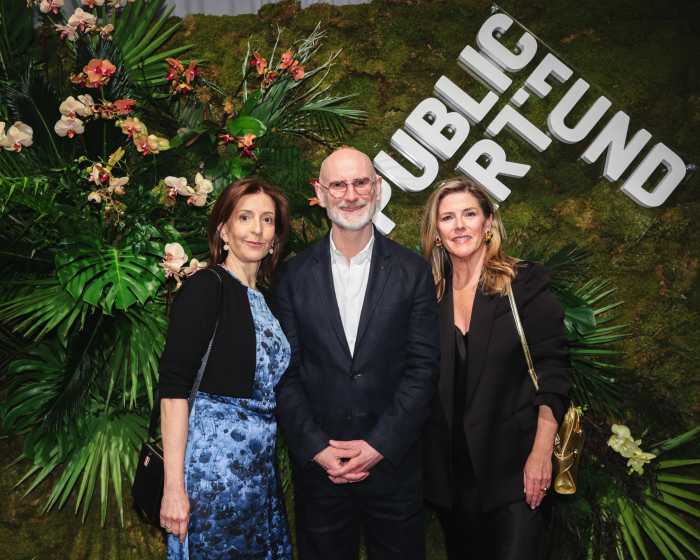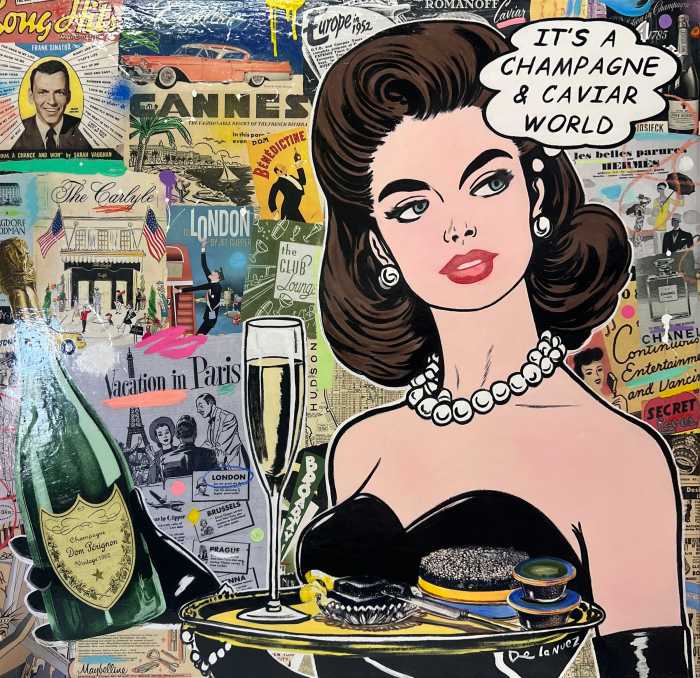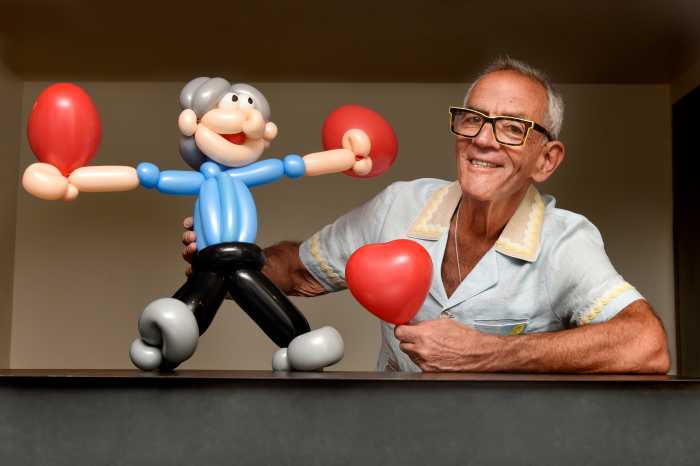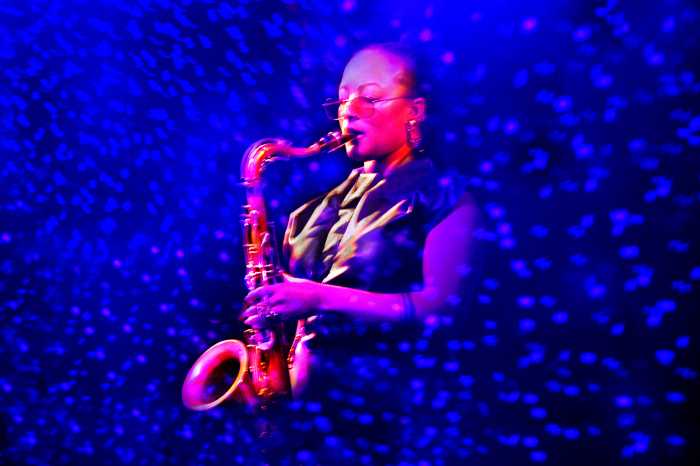By Lincoln Anderson
Robert Lederman had a smile on his face beneath his winter cap on the High Line Saturday morning. He and three other artists were freely vending their art in the brisk air.
The reason Lederman looked so relaxed was because, the previous day, Parks Commissioner Adrian Benepe had personally assured him he would not be arrested again for selling his art on the former elevated railway turned park.
The four artists had their display stands discretely set up against a wall where the High Line passes underneath a building at 14th St. and Tenth Ave. The little group of artists’ presence lent an almost European feeling to the stretch.
Around 1 p.m., one of Lederman’s works — prominently featuring an eye — caught the eye of Gabriele Gardiner, a German who lives in Florida. She purchased the mixed-media painting, called “Looking at You,” for $30.
Asked why she liked it, she said, “The eye — and the lips.”
A few minutes before, Ned Otter — two stands south of Lederman — had sold a photo of his of a wooden rooftop water tank for $50 to Erwan Saout, a young Frenchman who lives in New York.
Jack Nesbitt, stationed between Lederman and Otter, noted when people like his stuff, “they really like it,” though he hadn’t sold anything yet.
The fourth artist, Xu Zi, was offering to do parkgoers’ pastel portraits for $250. There were no takers, but she noted she was mainly out there in the freezing weather to show support for Lederman and for street artists’ rights.
All of their display stands were within regulation size: no larger than 8 feet long, 5 feet high and 3 feet wide.
Lederman contentedly noted that no Parks Enforcement Patrol officers or High Line staffers had hassled them in the two hours they had been selling.
Although the artists were set up in a sheltered spot, Lederman said it was only because of the temperature, and that, as far he was concerned, he wasn’t in a designated vending area.
“It’s less cold in here and less exposed,” he said. “On a less-cold day, I might want to be in a different spot.”
Santas can pass by
Suddenly, a large red mass came into view moving woozily up the High Line from Gansevoort St. It was SantaCon — a Christmas-themed bar crawl taking a detour along the new park. The rowdy revelers passed by the artists with plenty of room to spare. “Artists Power!” some shouted out supportively, noticing the slogan on yellow placards hanging off some of their stands.
“You can see,” Lederman observed, “even if 1,000 people walk by here, it’s not going to get crowded.”
Lederman, president of A.R.T.I.S.T. (Artists’ Response to Illegal State Tactics) had been arrested twice in recent weeks for selling on the High Line without a permit. After the first arrest, on Nov. 21, Lederman — who has repeatedly won vending-rights lawsuits against the city — announced he would file suit, charging that no permit was needed. Nevertheless, Parks Enforcement Patrol officers arrested him again Dec. 6.
The lawsuit Lederman et al. v Giuliani resulted in the city in 2001 writing a consent order that it is legal to sell art — considered a form of free speech — in all the city’s public parks without a permit.
On Wed., Dec. 9, The Villager published an editorial, “The High Line and art,” calling for the Parks Department to stop arresting Lederman and other artists for expressing their constitutionally protected right to free speech.
“The Parks Department and the Friends of the High Line need to clarify quickly what they are doing on the High Line in terms of artists,” the editorial stated. “We’re told new regulations may be forthcoming soon; until then, though, the arrests of Lederman and any other artists should stop. Simply put, these arrests appear to be illegal as far as we can discern.”
The following day, Thursday, The Villager’s editorial was posted online, and Lederman said he forwarded it — “the second I found it” — to Mayor Mike Bloomberg, whom he says he corresponds with.
Lederman next e-mailed The Villager’s editorial to Benepe; then to Alesandro Oliviero, the Parks Department’s legal counsel; and also to Kevin Jeffrey, head of the Parks Enforcement Patrol officers.
Meets with Parks chief
Early the next morning, Friday, Lederman received a phone call from Benepe’s assistant asking him to come to the Arsenal — the Parks Department headquarters — later that day for a meeting to discuss the situation. Along with Lederman came Nesbitt, who was arrested with him on the High Line on Dec. 6, and Lederman’s attorney, Julie Milner. On the Parks side were Benepe, Oliviero and Jeffrey.
Lederman said the meeting was cordial. First, he said, Benepe personally apologized to him for the arrests, and told him all the charges against him and Nesbitt have been dropped.
“They said that I can sell on the High Line,” Lederman recounted. “They said, ‘You won’t have any problem.’ … They did say, ‘You’re the first artist who’s ever come up on the High Line to vend — you took us by surprise.’”
Next, he said, Benepe tried to explain to him how special the High Line park is.
“He’s saying, ‘Oh, it’s up in the air,’” Lederman said. “‘People could fall off the High Line.’ He said, ‘What if there’s a fire up there and everybody’s running off?’ I said, ‘They’ll run down the stairs. And there’s nothing up there to burn — it’s concrete and steel.’
“Then he stated the same stuff he’s been telling the media — ‘It’s special.’ But it’s not so special the First Amendment doesn’t apply.”
Benepe, in turn, reportedly told Lederman what Parks is proposing in terms of accommodating artists and other free speech-protected vendors — sellers of printed matter and music — on the High Line: namely, that, along with three spots for food vendors — who do need permits — there would be three spots for free-speech vendors, with only one artist or book vendor, etc., in each location.
Calling the proposal unacceptable, Lederman told The Villager, “It’s an insult to the First Amendment.”
The street-artist activist has previously noted that existing park regulations already prohibit vendors from blocking exits, entrances, stairways, paths or benches. Plus, he has said, he concedes that artists should not vend along the park’s narrower pathways, but should stick to its wider areas, and that he would not have a problem if Parks makes that a specific regulation for the High Line.
Cap would be challenged
Lederman said he told Benepe that trying to limit artists’ numbers on the High Line would be legally indefensible.
“If Benepe makes a rule — ‘Three artists on the High Line’ — someone might challenge that,” Lederman stated. “It doesn’t have to be me.”
At another point, though, he said, “As soon as they pass that law, we would seek an injunction.
“I don’t think they’re serious,” the artist reflected. “I think they’re trying to feel me out.”
As for his lawsuit, Lederman isn’t dropping it. At the meeting, he served Parks with a notice of claim, the first step in a lawsuit. The defendants are Benepe; the Parks Department; the Friends of the High Line, the conservancy that operates the park; and PEP Officer B. Joseph, who arrested him Nov. 21. Lederman indicated he sort of regrets suing Joseph.
“He was being used by the Friends of the High Line Rangers,” he said. “They forced him to do it. That’s why he was nervous.”
Asked if he was seeking a cash settlement, Lederman said, “That’s certainly an option,” adding, “There is no defense that they could possibly mount” for arresting him on the High Line.
If Parks is afraid the High Line will be mobbed with artist vendors — that the “floodgates will open” — the artist activist predicted it won’t happen.
“There’s not going to be any floodgates [opening],” he said. “Most artists are looking for a lot of foot traffic. There are some places in New York where 100,000 people pass you in a day. I told Benepe, I don’t think you’re ever going to get hordes of people on the High Line.”
‘Interim, designated spots’
Vickie Karp, a Parks spokesperson, confirmed that the meeting between Benepe, Lederman and the others took place.
“In the spirit of making the High Line available to all, the discussion included the decision by Parks to designate a number of vendors spots for an interim period,” Karp said. “These will include spots for food vending and expressive-matter vending.”
Told that Parks was calling the arrangement “interim,” Lederman shot back, “They continue to act as if they are ‘offering’ artists, or me, something.The right of free speech in all New York City parks is ours already. It is not theirs to offer it, to ‘permit’ it, or to deny it. I am upholding the law. They are distorting it.”
Lederman said the fact that there were four artist vendors on the High Line last Saturday wasn’t planned to show Parks that they don’t have to abide by any presumed three-artist limit.
“It just happened,” he said.



